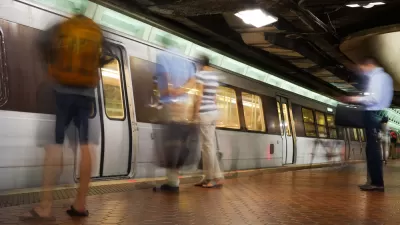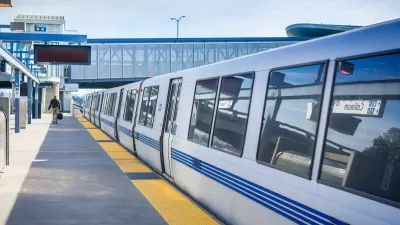Reflecting on the significance and impact of Superstorm Sandy, Bill McKibben and Lawrence J. Hanley propose a 3-step process focused on mass transit that America should pursue to promote community development, public health and the environment.
For McKibben and Hanley, Hurricane Sandy has made it clear that politicians can no longer push climate change under the rug. Climate change contributes to rising sea levels and record heat waves, and the implications of these phenomenon are more apparent that ever before. For one significant place to tackle carbon emissions, they point to the transportation sector, and its role in contributing to 27 percent of total U.S. greenhouse gas emissions. That's not the only way in which our auto-reliant lifestyles are harming the country. "The transport sector," they say, "contributes 80 percent of the harmful air pollutants that cause 1.3 million premature deaths each year. Road fatalities claim 33,000 lives per year on average, making traffic accidents the number one killer of people under 34 in the U.S. And traffic congestion is known to elevate stress levels and reduce quality of life for millions."
On the other hand, explain McKibben and Hanley, data from a recent poll conducted by the Natural Resources Defense Council suggests that Americans are ready and willing to use public transportation and that they want to be less car dependent. However, they are often confronted with obstacles including what many believe are "outdated, unreliable and inefficient" public transportation systems across the country. The 3-steps they propose to address these matters includes: (1) stopping the budget cuts on public transit, (2) redirecting federal investments to expand and improve transit systems, and (3) making transit free or less costly by reallocating fossil fuel subsidies.
In conclusion, they warn that Hurricane Sandy was a “harbinger of what the future will bring” with continued global warming, and articulately state that “[w]hen Sandy flooded New York's subways, it brought the city to a halt. Re-opening the system was a challenge -- but the real challenge is bringing mass transit to a nation that very much wants it.”
FULL STORY: Think About the Transportation Sector

Alabama: Trump Terminates Settlements for Black Communities Harmed By Raw Sewage
Trump deemed the landmark civil rights agreement “illegal DEI and environmental justice policy.”

Planetizen Federal Action Tracker
A weekly monitor of how Trump’s orders and actions are impacting planners and planning in America.

The 120 Year Old Tiny Home Villages That Sheltered San Francisco’s Earthquake Refugees
More than a century ago, San Francisco mobilized to house thousands of residents displaced by the 1906 earthquake. Could their strategy offer a model for the present?

LA’s Tree Emergency Goes Beyond Vandalism
After a vandal destroyed dozens of downtown LA trees, Mayor Karen Bass vowed to replace them. Days later, she slashed the city’s tree budget.

Sacramento Leads Nation With Bus-Mounted Bike Lane Enforcement Cameras
The city is the first to use its bus-mounted traffic enforcement system to cite drivers who park or drive in bike lanes.

Seattle Voters Approve Social Housing Referendum
Voters approved a corporate tax to fund the city’s housing authority despite an opposition campaign funded by Amazon and Microsoft.
Urban Design for Planners 1: Software Tools
This six-course series explores essential urban design concepts using open source software and equips planners with the tools they need to participate fully in the urban design process.
Planning for Universal Design
Learn the tools for implementing Universal Design in planning regulations.
Ada County Highway District
Clanton & Associates, Inc.
Jessamine County Fiscal Court
Institute for Housing and Urban Development Studies (IHS)
City of Grandview
Harvard GSD Executive Education
Toledo-Lucas County Plan Commissions
Salt Lake City
NYU Wagner Graduate School of Public Service




























